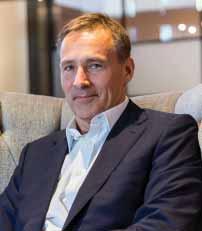
8 minute read
An Essential Service
Image courtesy of Myzone.
In the month when the world marks two years of living with COVID, members of the Global Health and Fitness Alliance’s Advisory Council share details of their mission with Kate Cracknell
Advertisement
Forged in 2020 as COVID lockdowns first impacted, the Global Health and Fitness Alliance (GHFA) has set out to confirm health and fitness clubs as an essential service.
Since the early part of 2020, the health and fitness industry around the world has been decimated, with thousands of gyms closing their doors forever - a direct result of the devastating impact of lockdown.
All of this has happened in spite of surging interest in health and wellbeing among populations and governments across the globe. It’s happened in spite of the health and fitness sector’s unparalleled health credentials. At the very moment when fitness facilities’ physical, mental and emotional health benefits were needed more than ever, lockdown saw those clubs forced to close.
This was the catalyst that led to the creation of the Global Health & Fitness Alliance (GHFA).
Sector leaders around the world recognised an opportunity and a need to come together with a singular focus, a global remit and the authority to move at pace. Facilitated by IHRSA, they did exactly that, forming the GHFA in 2020: a global alliance of expert leaders from across the health and fitness industry, collaborating to evidence the sector’s value to society and public health, establish clubs as an essential service, and lay new foundations for the future growth and success of the entire sector.
Here, the members of the GHFA Advisory Council go into more detail about what the Alliance has set out to achieve, why, and how it’s approaching this important task.
Greg Oliver, Chief Executive, Fitness & Lifestyle Group (Australia and Asia-Pacific)
“Our mission is to have health and fitness clubs recognised, across the globe, as an essential service - one that is committed to solving the crisis of physical inactivity. This is both a long- and a short-term mission.
“In the short term, it’s about survival. We have to grow awareness of our sector’s vital health contribution, so clubs can stay open even if other sectors go back into lockdown.
“In the longer term, ‘essential’ is about the evolution and growth that comes from being recognised as a powerful, value-adding sector for societies and individuals worldwide.
“It all starts by evidencing our sector’s value to society and public health; many of the decisions made during the pandemic stemmed from external lack of awareness of what our sector really does. The clue to our value is in our name: we are health, not hospitality.
“Through research and advocacy, we will strengthen our sector’s voice at the table of the World Health Organization, Organisation for Economic Co-operation and Development, UNESCO (the United Nations Educational, Scientific and Cultural Organization) and other United Nations/international organisations. We will demonstrate our value to their agendas, to in turn influence the agendas of national governments.”
Brian Morris, founder and Chief Executive, Aspria Group (Europe)
Introducing the GHFA’s research, Morris explains “we’re currently focused on two complementary research initiatives which together will strongly evidence our case for essential status. “The first is a major new report - Economic Impact & Societal Wellbeing: Quantifying the Contribution of the Global Health & Fitness Sector - which we’ve commissioned from Deloitte. This report has been funded by donations from GHFA supporters and will be launched in Q2 of this year.
“Covering around 60 countries initially, which between them account for the majority of the global health and fitness club market, the report will analyse the social, health and economic contribution of our sector. It will deliver a comprehensive view of our direct and indirect value to society.
“The second research initiative, I will hand over to Emmett to speak about.”
Emmett Williams, Partner, Myzone (global)


“The second piece (of research) is what we’re calling our ‘efficacy stream’: a research project designed to quantify the impact and efficacy of health and fitness clubs’ product. “Building on existing studies of the benefits of being physically active generally, this project aims to evidence clubs’ positive impact on health and wellbeing above and beyond the benefits of independent exercise. We plan to release this at the same time as the Contribution report.
“We will then continue to grow and expand both bodies of research over time, potentially commissioning our own studies for the efficacy stream.” Richard Beddie, Chief Executive ExerciseNZ and Board Chief of Staff, International Confederation of Registers for Exercise Professionals (ICREPs) (global)

“The GHFA and WHO agendas are fully aligned. We see a pivotal role for our sector in helping reduce global physical inactivity and were delighted to see the WHO designate physical activity a ‘must have’ in its recent Fair Play briefing. “We believe everyone should have the opportunity to support their health by being physically active in whatever way, or ways, they choose. But we also recognise that our sector can and should do even more in its quest for essential status. We must all play our part in continuing to promote and grow physical activity around the world, in further democratising our offering, and in creating an even more inclusive future.
“Our whole industry is built to address physical inactivity. Let’s prove our commitment to that.”
Gigliola Aycardi, Vice-President and co-founder, Bodytech (Americas)
Explaining the ‘G’ in the GHFA’s name, Aycardi states “you just need to look at the markets represented by the Advisory Council members to realise that the GHFA is truly global: one unified voice representing the health and fitness club sector around the world. “And it doesn’t stop with the Council. We’re supported by senior level, multinational working groups of leaders who help drive forward critical initiatives such as our research projects. Underpinning all of this is our network of supporters around the world.
“This really is a broad alliance of leading health club operators, suppliers, national and international associations and allied organisations, and we already have backing from all corners of the globe. If you haven’t yet signed up, though, there is still time: we continue to welcome new supporters.”

Image courtesy of Les Mills.
Anna Henwood, Chief Marketing Officer, Les Mills International (global)
“Our entire mission is vitally important for the whole sector, but I’m excited by the long-term potential that’s encapsulated in ‘essential’. “Confirming clubs’ essential status will empower operators around the world to build their businesses on new, more expansive foundations, collaborating with governments, speaking to a more receptive and diverse end user and enjoying far greater scope to grow, contribute to society and ultimately thrive. New audiences, new products, new partnerships, new collaborations - we will become an ally to governments and a go-to for consumers.
“That’s a very exciting prospect and fundamental to our future success as a sector.”

Equipt t TM Eco o Gym m Reusable e Bamboo o Wipes
helping gym operators and members keep surfaces clean without costing the earth .


3 pack members price RRP $12 Disinfectant Dispenser $235 rice ser Towel RRP $29 Tow Attachable button. Atta






Make a commitment to help reduce the environmental impact of single use disposable wipes from circulating every year with Equipt t TM Eco o Gym m Wipes s

Andrea Bell, co-founder, Director and Chief People Officer, Inspire Brands Asia (Asia-Pacific)
As to whether the GHFA’s mission’s is achievable, Bell adds “it is absolutely achievable. “As with anything, it starts with one breakthrough to get the ball rolling. I was therefore delighted when, in September last year, the Philippines Government recognised and publicly announced that fitness is essential. This was a huge win for the fitness industry in the Philippines, where clubs can now continue to operate even at Alert Level 4, but also globally.
Justin Musgrove, Chief Executive, Kun Real Estate (Middle East)
Advising what happens next with the research, Musgrove states “with COVID restrictions still in place in many markets, key conference and meeting dates are still to be confirmed, but we will be looking to present our findings as soon as we feasibly can, including to the WHO at a forthcoming Sports Sector dialogue meeting and, later this year, to the OECD’s Business and Health Forum.
“Meanwhile, our fundraising efforts are ongoing. As Emmett says, we need to continue building our evidence base. This will include bringing more markets into our contribution report.
“This is a marathon, not a sprint. We need funding to ensure we can continue our work.”
Anastasia Yusina, President, Strata Fitness Holding; founder of Orange Fitness, City Fitness and, FITSPACE Boutique Fitness (Europe and the Americas)

“Physical inactivity is a worldwide concern and a major contributor to the rise of non-communicable diseases across the globe. It’s why the WHO has set a goal of reducing global physical inactivity by 15% by 2030. “And yet our sector has historically struggled to be recognised as a valuable part of the solution. That’s why the GHFA, with its clear focus and new resources, is so important. “Our clubs already serve 200 million+ active members around the world. The powerful sum of our programming, expertise and environments, combined with our reach and impact, means there’s no equivalent substitute for what we do. We’re working to raise awareness of this globally.
“We believe every opportunity to be physically active should be regarded as essential - because it is to those individuals, and in turn to society.” For more information on the GHFA go to www.GHFAlliance.org Kate Cracknell is a UK-based freelance journalist, editor and copywriter.
Subscriptions
Subscribe to this magazine for just $99 (in Aus/NZ) for 12 months/six issues. To subscribe go to










